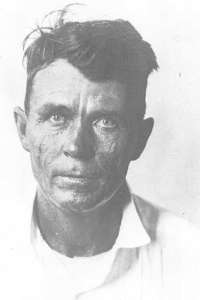James Alderman
| James Horace Alderman | |
|---|---|
 | |
| Born |
June 24, 1884 Hillsborough County, Florida |
| Died |
August 17, 1929 (aged 45) Fort Lauderdale, Florida |
| Cause of death | Execution by hanging |
| Occupation | Alcohol smuggler |
| Years active | 1907–1927 |
James Horace Alderman (in some sources Aldermon) (June 24, 1884 – August 17, 1929) was an alcohol smuggler during the Prohibition era in the United States. He became known in the press by names like the "King of the Rum Runners"[1] and the "Gulf Stream Pirate."[2]
Alderman was born in 1884 near Tampa, Florida. He spent several years in the Ten Thousand Islands area of southwest Florida as a farmer, fisherman, and field guide.[3] With his wife Pearl and three daughters, Bessie, Ruby, and Wilma, Alderman lived variously in Chokoloskee, Caxambas, Palmetto, and Tarracia Island before settling in Fort Meyers around 1911. After World War I and the passing of the National Prohibition Act, Alderman began smuggling illegal immigrants and alcohol from Cuba and the Bahamas to Florida. In the 1920s, he set up a base of operations in Miami.[4]
On the afternoon of August 7, 1927, Alderman and his associate Robert Weech were intercepted by a Coast Guard cutter in the waters between Florida and Bimini. After a series of events, Alderman killed U.S. Coast Guardsman Sidney C. Sanderlin and Secret Service agent Robert K. Webster. The cutter's machinist, Victor A. Lamby, was seriously wounded and later died.[5]
Alderman was tried under Sections 272, 273, 275 of the U.S. Criminal Code. In January, 1928, he was sentenced to death by U.S. District Judge Henry D. Clayton. President Herbert Hoover declined clemency.[1] Alderman was hanged on August 17, 1929, on newly erected gallows in a metal hangar at Coast Guard Base Six near Fort Lauderdale, the site of Bahia Mar Marina today. Media witnesses were barred from watching the execution.[1] It was the only hanging ever carried out by the Coast Guard, the first hanging in Fort Lauderdale, and the only legal execution in Broward County.[4]
Alderman's execution had initially been scheduled to be carried out in the Broward County jail, but the County Commissioners declined, insisting that a federal hanging should occur on U.S. property (from 1924 all executions by the state of Florida were carried out by electric chair).[1]
Notes and references
- 1 2 3 4 "Hangar Hanging". Time: 15. 1929.
- ↑ Buchanan, Patricia (1970). "Miami's Bootleg Boom". Tequesta: The Journal of the Historical Association of Southern Florida. 30: 24–25.
- ↑ Kaserman, Sarah (2011). Florida Pirates: From the Southern Gulf Coast to the Keys and Beyond. Charleston, SC: History Press. pp. 99–100. ISBN 1614231761.
- 1 2 Estorino, María R. (2004). "Guide to the James Horace Alderman Collection". Prepared for the University of Miami Libraries Special Collections Division, Coral Gables, FL. Retrieved January 4, 2014. This article incorporates text from this source, which has been released under a Creative Commons Attribution-ShareAlike 3.0 and GNU Free Documentation license.
- ↑ Buchanan, Patricia (1970). "Miami's Bootleg Boom". Tequesta: The Journal of the Historical Association of Southern Florida. 30: 25–26.
Further reading
- Caudle, Hal M. (1976). The Hanging at Bahia Mar. Fort Lauderdale, FL: Wake-Brook House. OCLC 003979526.
- Crankshaw, Joe (February 9, 1998). "Finding God on Death Row an Old Story". Miami Herald.
- Lehman, Frank (1979). Encounter with the Gulf Stream Pirate. OCLC 11105267.
- Rowe, Sean (December 4, 1997). "The Gallows and the Deep". New Times Broward-Palm Beach.
External links
Library and archival resources by or about James Horace Alderman.
- James Horace Alderman Collection, 1929, University of Miami Special Collections. This archival collection contains the typescript of Alderman's autobiography, The Life Story of James Horace Alderman, written during his imprisonment prior to execution.
- United States v. James Horace Alderman. U.S. District Court for the Miami Division of the Southern District of Florida. (1907 - ?). Copies of Alderman's indictment and death warrant, digitized by the U.S. National Archives.